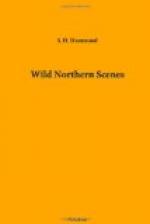“That story,” said Spalding, “reminds me of a bear story. I shall do as the Doctor did, tell it as it was told to me. I did not see the bear, but I know the man who was the hero of it, and his brother told the story in his presence one day, and he made no denial. He at least is estopped from disputing it, and we lawyers call that prima facie evidence of its truth. It occurred a long time ago, when there were fewer green fields in Oswego county and especially in the town of Mexico, than there are now. The old woods stood there in all their primeval grandeur. The waves of Ontario laved a wilderness shore, and their dull sound, as they came rolling in upon the rocky beach, died away in the solitudes of a gloomy and almost boundless forest. Here and there a ‘clearing’ let in the sunlight, and the woodman’s axe broke the forest stillness as he battled against the brave old trees. The smoke of burning fallows was occasionally seen, wreathing in dense columns towards the sky. Civilization, enterprise, energy and new life were just starting on that career of progress which has moved onward till the wilderness, under the influence of their mighty power, has been made to blossom as the rose. Those were pleasant times, as we look upon them now, just fading into the dim and shadowy past, but they were times of toil and privation. The arms of the men of those times were nerved by the hope of the future, and the spirit that sustained them was that of faith in the fact that the promise of reward for their labor was sure.
“Do the men of the present day ever think what a gigantic labor that was of clearing away those old forests? Contemplate a wilderness, reaching from the Atlantic to the Mississippi, from the great lakes and the majestic St. Lawrence to the Gulf of Mexico, every acre of which was covered with tall trees which had to be cut away one by one, not with some great machine which mowed them down in broad swaths like the grass of a meadow, but by a single arm and a single axe. Talk about the Pyramids, the Chinese Wall, the great canals of the earth! They sink into utter insignificance when compared with the prodigious labor of clearing away the American forests, and spreading out green fields where our fathers found only a limitless wilderness of woods. The sons of these men who performed that labor, in my judgment, have a better patent to preferment and honors than those who come from other lands to claim their inheritance after it has been thus perfected by such toil and hardships, and dangers as the history of the world cannot parallel.”
“I think, if I remember rightly,” said the Dr., “you set out to tell a bear story. You are now indulging in a sermon on progress. Allow me to call your attention to the bear.”
“I appeal to the court,” said Spalding, addressing Smith and myself, “against this interruption.”
“The counsel will proceed,” said Smith, with all the gravity of a judge; “we hope the interruption will not be repeated.”




